Admissions Open for
Why Music Class is Beneficial
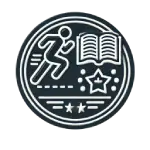
Promotes Discipline and Perseverance

Promotes Cognitive Development

Teaches Teamwork and Cooperation

Emotional Well-being

Promotes Cognitive Development
Music Fundamentals
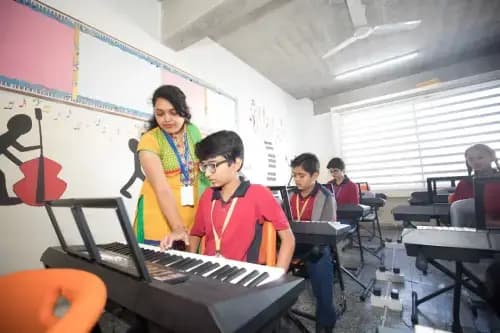
- Melody – A succession of sounds in a harmonic sequence that follows a pleasing and recognizable pattern of sound, a fundamental aspect of performance art.
- Texture – The way of combining different musical instruments and layers, for example, a combination of melody and harmony, crucial in school music labs.
- Rhythm – It is the sequence or pattern of beats and timing that produces movement and flow in music, often explored in music facilities in schools.
- Pitch – The height or depth of a sound, depending on the frequency of vibrations, a key concept in why study music discussions.
- Keys and Clef – A key defines the tonal center of a piece, while a clef determines pitch positions on a musical staff, essential knowledge in music lab in school settings.
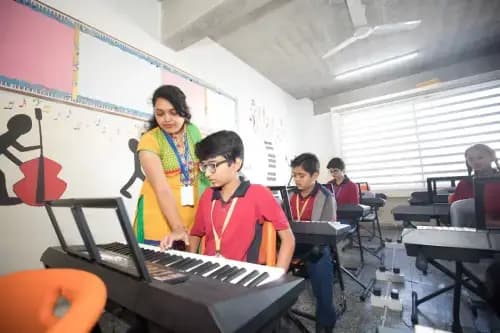
Fundamentals of Music
- Melody – A succession of sounds in a harmonic sequence that follows a pleasing and recognizable pattern of sound, a fundamental aspect of performance art.
- Texture – The way of combining different musical instruments and layers, for example, a combination of melody and harmony, crucial in school music labs.
- Rhythm – It is the sequence or pattern of beats and timing that produces movement and flow in music, often explored in music facilities in schools.
- Pitch – The height or depth of a sound, depending on the frequency of vibrations, a key concept in why study music discussions.
- Keys and Clef – A key defines the tonal center of a piece, while a clef determines pitch positions on a musical staff, essential knowledge in music lab in school settings.
Highlights of our Music
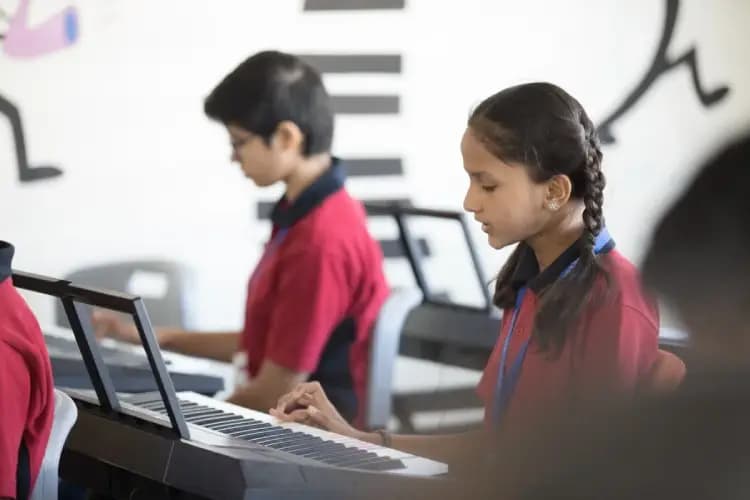
Nursery, K1 & K2
- Musical Exploration – Involve students in sounds, rhythms, and fun musical games using various musical instruments.
- Sing-Along Sessions – Foster vocal expression & confidence using engaging nursery rhymes and songs, a practice supported in many schools with music labs.
- Basic Rhythm Training – Develop simple beats and body movement for coordination, enhancing performance art skills.
- Creative Expression – Foster storytelling and imagination through music, demonstrating why studying music is valuable from an early age.
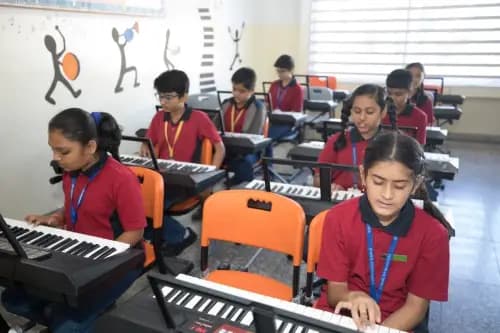
Grade 1-2
- Introduction to Instruments – Tactile learning on percussion and simple melodic musical instruments, a core feature of any school music lab.
- Fundamentals of Melody & Rhythm – Learning simple tunes and rhythmic patterns, developing core skills essential in music facilities in schools.
- Vocal & Group Singing – Fun choir and singing activities to promote teamwork, an essential part of performance art.
- Musical Appreciation – Listening activities that introduce students to different sounds, genres, and cultures, fostering an understanding of why study music
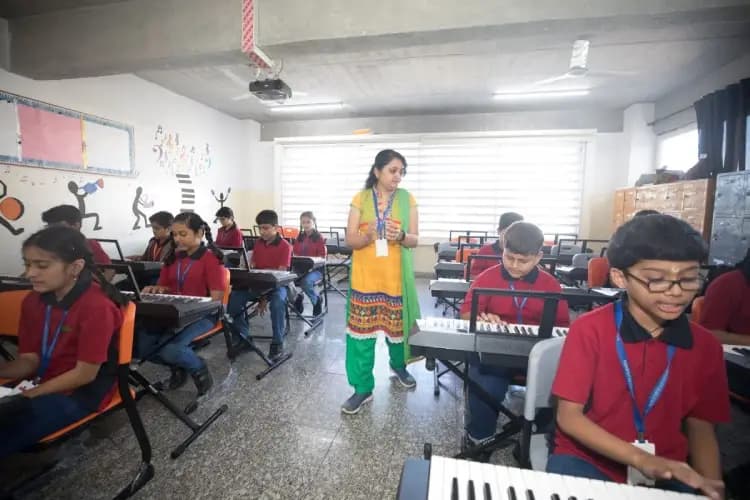
Grade 3-5
- Music Theory & Notation – Understanding basic musical notes, scales, and symbols, a vital lesson in schools with music labs.
- Instrumental Practice – Playing melodies with instrumentation recorders, keyboards, or percussion and skills development through access to music facilities in school.
- Composition & Creativity – the opportunity for a musician to improvise, which is vital to any performance art and promotes the creation of new music.
- Performance & Collaboration – Building confidence through group performances and musical projects, a key reason why music lab in schools is important.
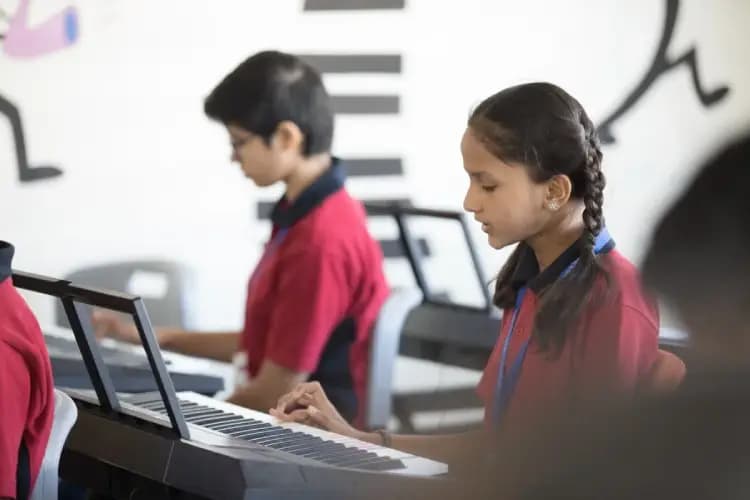
Nursery, K1 & K2
- Musical Exploration – Involve students in sounds, rhythms, and fun musical games using various musical instruments.
- Sing-Along Sessions – Foster vocal expression & confidence using engaging nursery rhymes and songs, a practice supported in many schools with music labs.
- Basic Rhythm Training – Develop simple beats and body movement for coordination, enhancing performance art skills.
- Creative Expression – Foster storytelling and imagination through music, demonstrating why studying music is valuable from an early age.
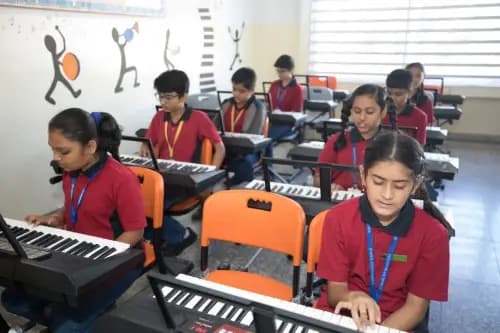
Grade 1-2
- Introduction to Instruments – Tactile learning on percussion and simple melodic musical instruments, a core feature of any school music lab.
- Fundamentals of Melody & Rhythm – Learning simple tunes and rhythmic patterns, developing core skills essential in music facilities in schools.
- Vocal & Group Singing – Fun choir and singing activities to promote teamwork, an essential part of performance art.
- Musical Appreciation – Listening activities that introduce students to different sounds, genres, and cultures, fostering an understanding of why study music
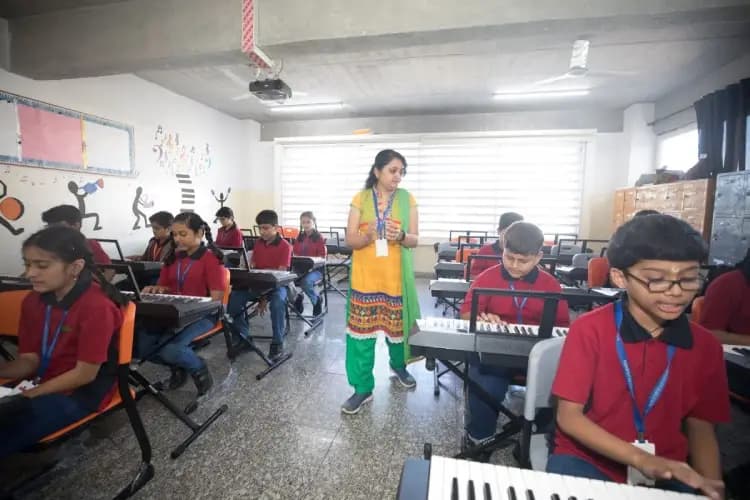
Grade 3-5
- Music Theory & Notation – Understanding basic musical notes, scales, and symbols, a vital lesson in schools with music labs.
- Instrumental Practice – Playing melodies with instrumentation recorders, keyboards, or percussion and skills development through access to music facilities in school.
- Composition & Creativity – the opportunity for a musician to improvise, which is vital to any performance art and promotes the creation of new music.
- Performance & Collaboration – Building confidence through group performances and musical projects, a key reason why music lab in schools is important.
Our Music Lab Setup
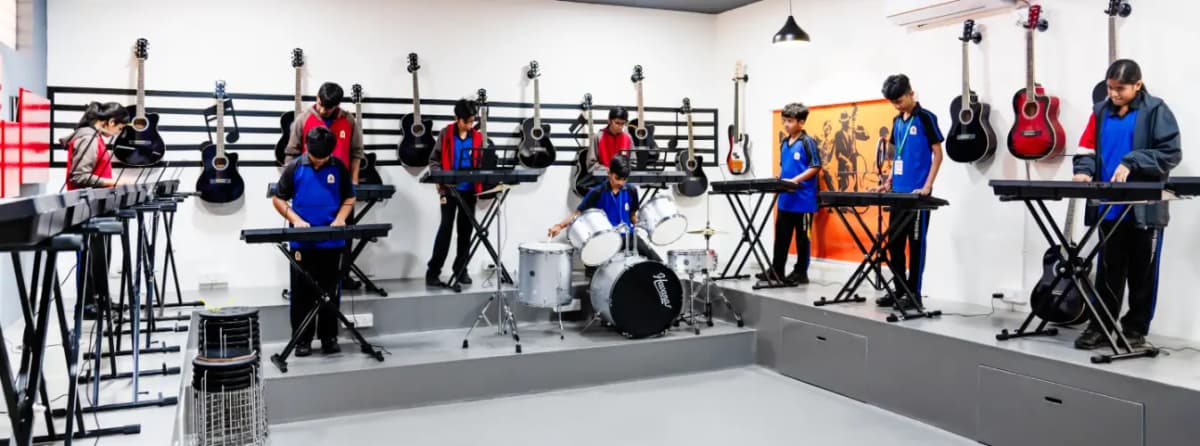
Orchids Music Lab is an exciting music hub, commonly referred to as The Melodic Hub, where young musical minds are groomed and hardened into an engaging and interactive learning atmosphere
- •Variety of Instruments and Active Learning – Students practice rhythms, melodies, and harmony with musical instruments including percussion, string, and keyboards in this one of the best school music labs.
- •Personal & Shared Spaces – Private practice studios with headphones for focused learning, alongside a common studio space for collaborative performances, a feature of leading schools with music labs.
- •Music Technology Integration – Equipped with music software, digital tools, amplifiers, and recording systems to enhance artistic learning and creativity, making it an advanced music lab in school.
- •Performance & Expression Space – A dedicated stage with a soundproofed environment, boosting confidence through solo and group showcases, enhancing performance art training.
Explore the Music Activity
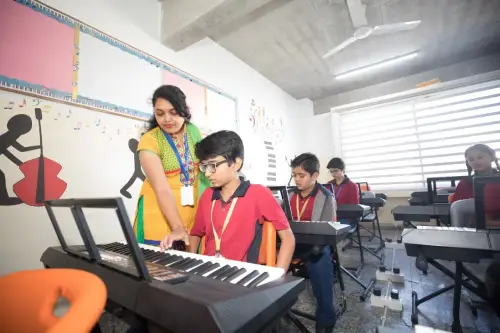
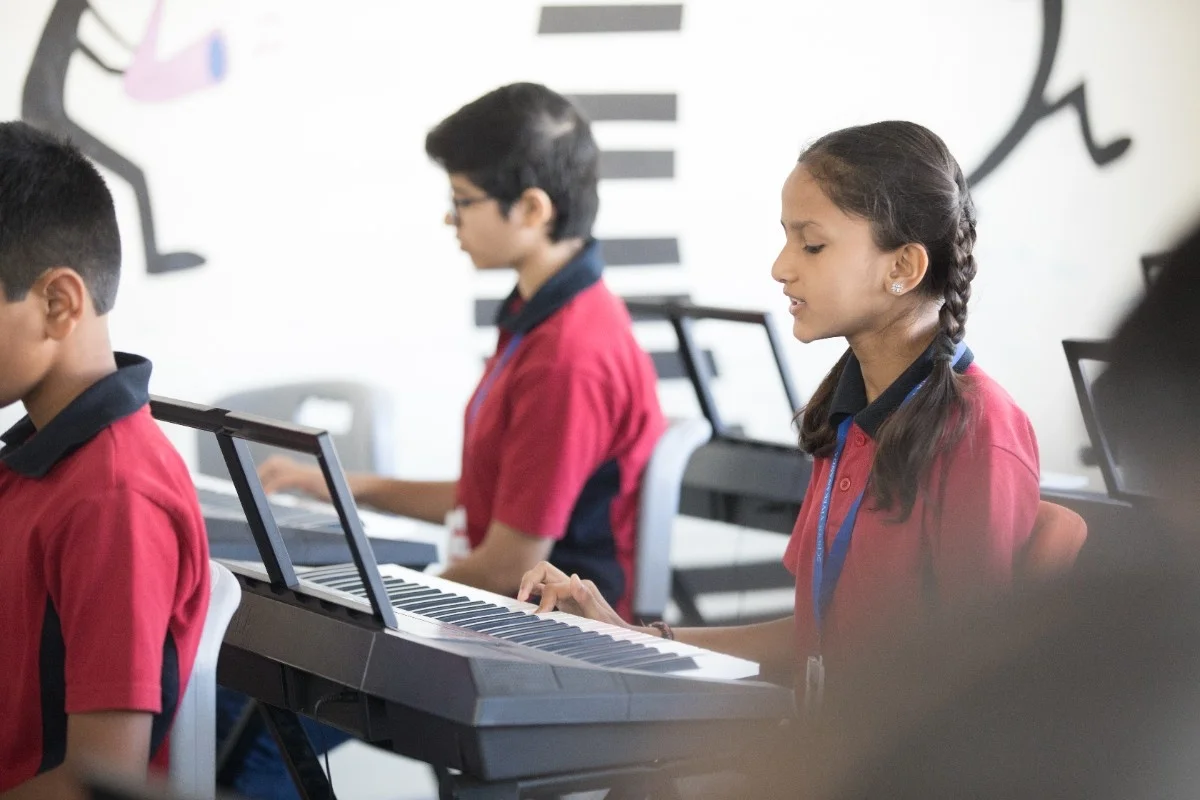
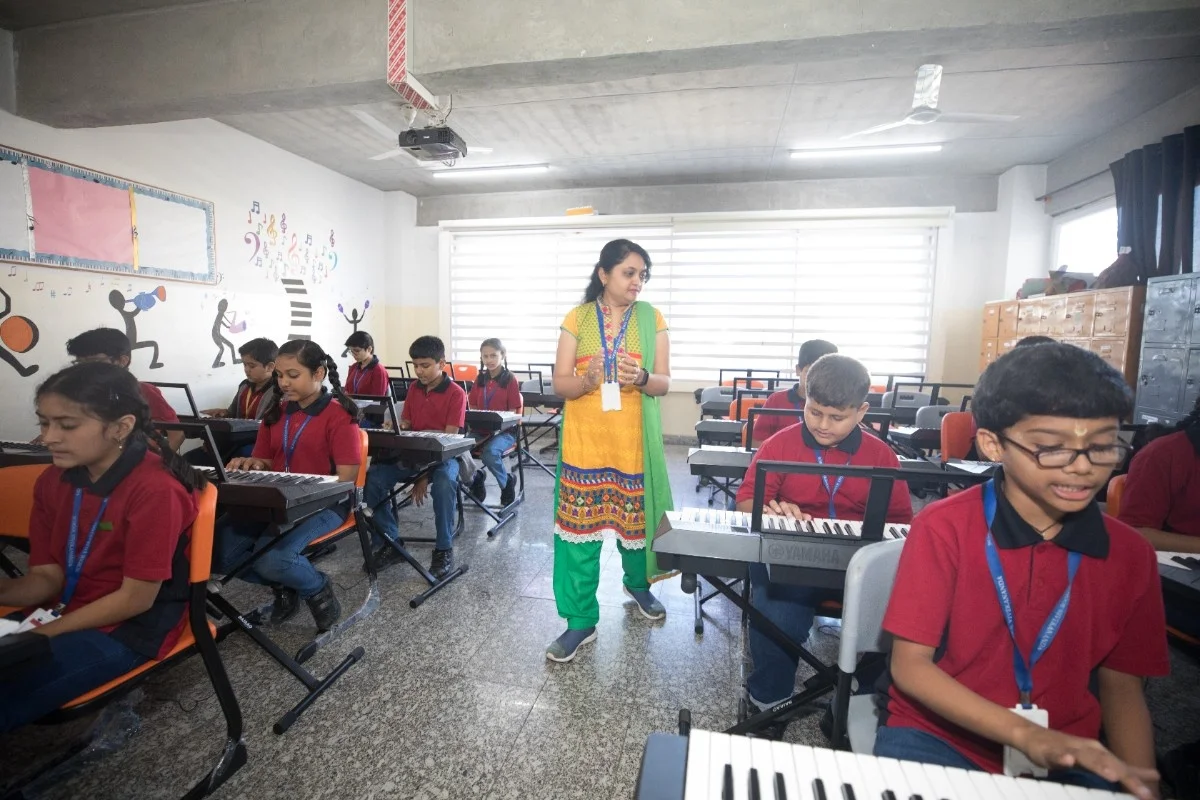
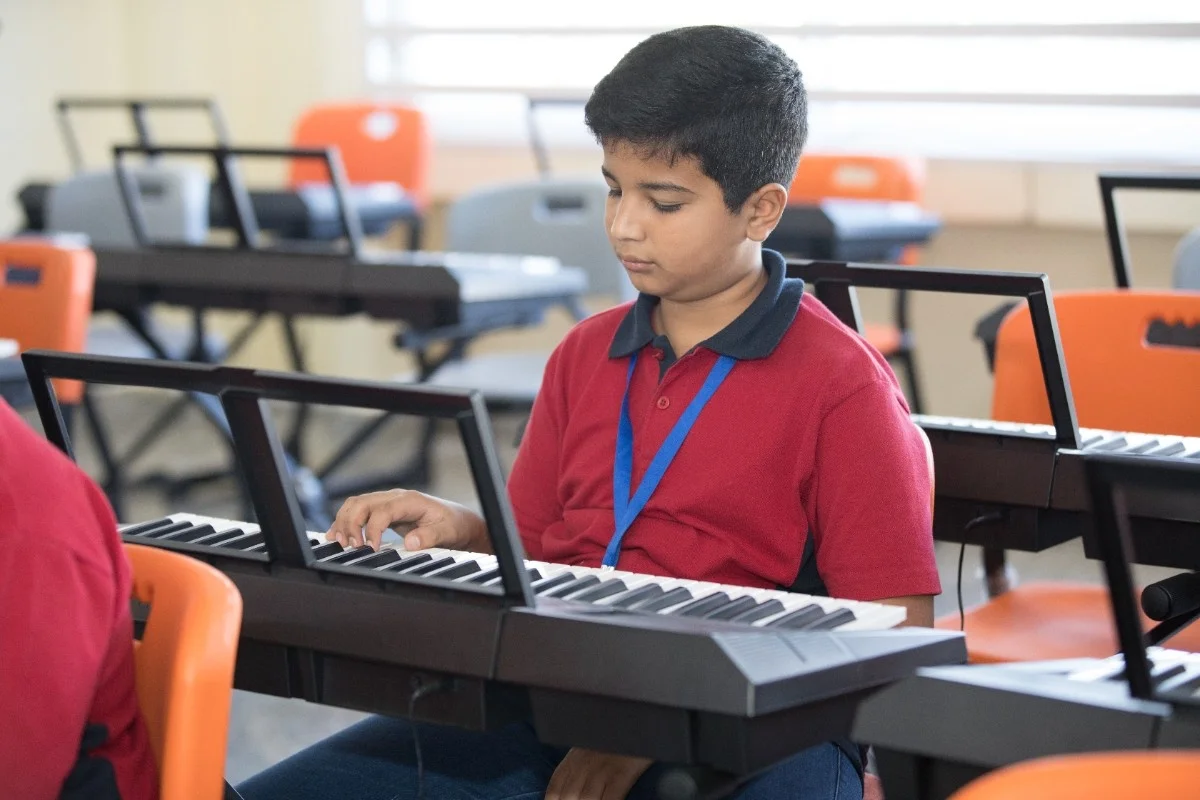
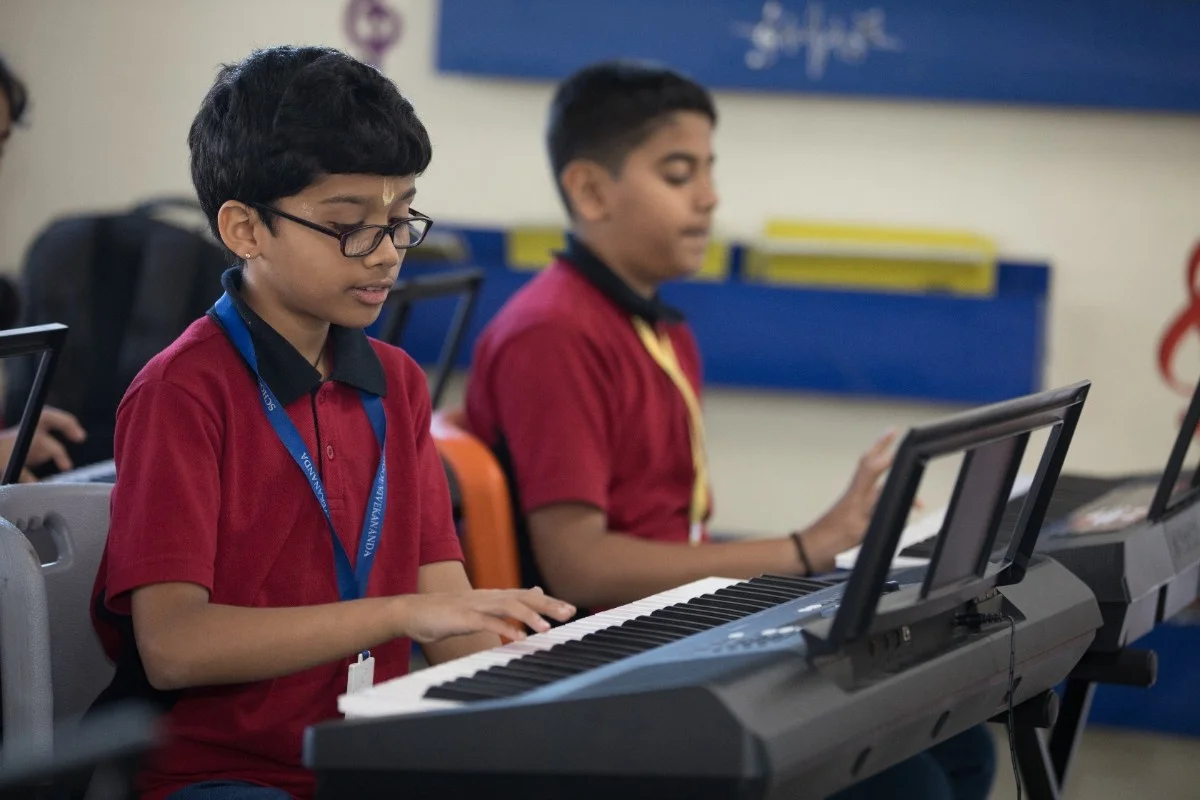
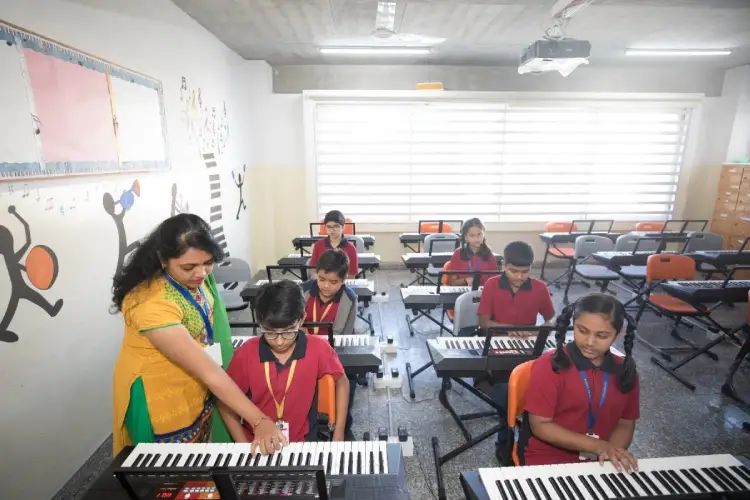
Frequently Asked Questions
Orchids The International School emphasizes a holistic education approach, integrating music into its curriculum. Many branches feature well-equipped Music Labs, providing students with opportunities to explore various musical instruments and vocal techniques. These labs serve as creative sanctuaries where young musicians can develop their talents. However, the availability of Music Labs may vary by location. For specific information about a particular branch, it's advisable to contact the school directly.
Music Labs typically offer instruction in a variety of instruments, catering to different musical interests and skill levels. Commonly taught instruments include guitar, piano, drums, and violin, which are popular among beginners and advanced learners alike. Many music labs also provide training in bass guitar, keyboard, and ukulele for diverse musical styles. Wind instruments such as saxophone, flute, and clarinet are often part of the curriculum. Additionally, some labs offer lessons in traditional and ethnic instruments like sitar or djembe. Digital music production and electronic instruments such as synthesizers may also be included in modern music labs. The courses are designed for both individual and group learning, making music accessible to all ages.
CBSE Schools In Popular Cities
- CBSE Schools in Bangalore
- CBSE Schools in Mumbai
- CBSE Schools in Pune
- CBSE Schools in Hyderabad
- CBSE Schools in Chennai
- CBSE Schools in Gurgaon
- CBSE Schools in Kolkata
- CBSE Schools in Indore
- CBSE Schools in Sonipat
- CBSE Schools in Delhi
- CBSE Schools in Rohtak
- CBSE Schools in Bhopal
- CBSE Schools in Aurangabad
- CBSE Schools in Jabalpur
- CBSE Schools in Jaipur
- CBSE Schools in Jodhpur
- CBSE Schools in Nagpur
- CBSE Schools in Ahmednagar
- CBSE School In Tumkur













